8-64. WHAT DO YOU NEED TO SKETCH A PARABOLA?
The Graph of a Quadratic Function
A quadratic function is a polynomial part of degree ii which tin can be written in the full general form,
Hither a, b and c represent existent numbers where The squaring function is a quadratic function whose graph follows.
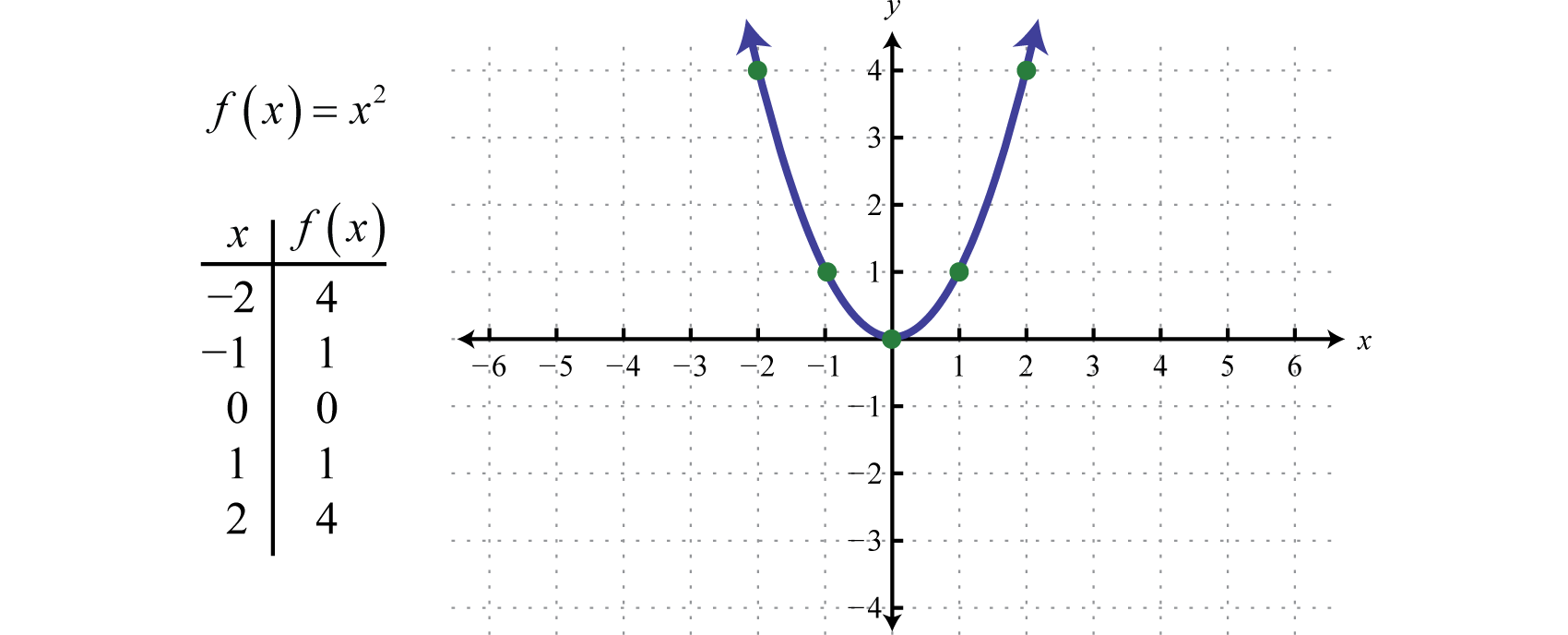
This general curved shape is called a parabolaThe U-shaped graph of whatsoever quadratic function defined by , where a, b, and c are existent numbers and and is shared past the graphs of all quadratic functions. Note that the graph is indeed a role every bit it passes the vertical line test. Furthermore, the domain of this function consists of the prepare of all real numbers and the range consists of the set of nonnegative numbers
When graphing parabolas, we want to include certain special points in the graph. The y-intercept is the point where the graph intersects the y-centrality. The x-intercepts are the points where the graph intersects the x-centrality. The vertexThe signal that defines the minimum or maximum of a parabola. is the point that defines the minimum or maximum of the graph. Lastly, the line of symmetryThe vertical line through the vertex, , about which the parabola is symmetric. (also called the axis of symmetryA term used when referencing the line of symmetry. ) is the vertical line through the vertex, nearly which the parabola is symmetric.
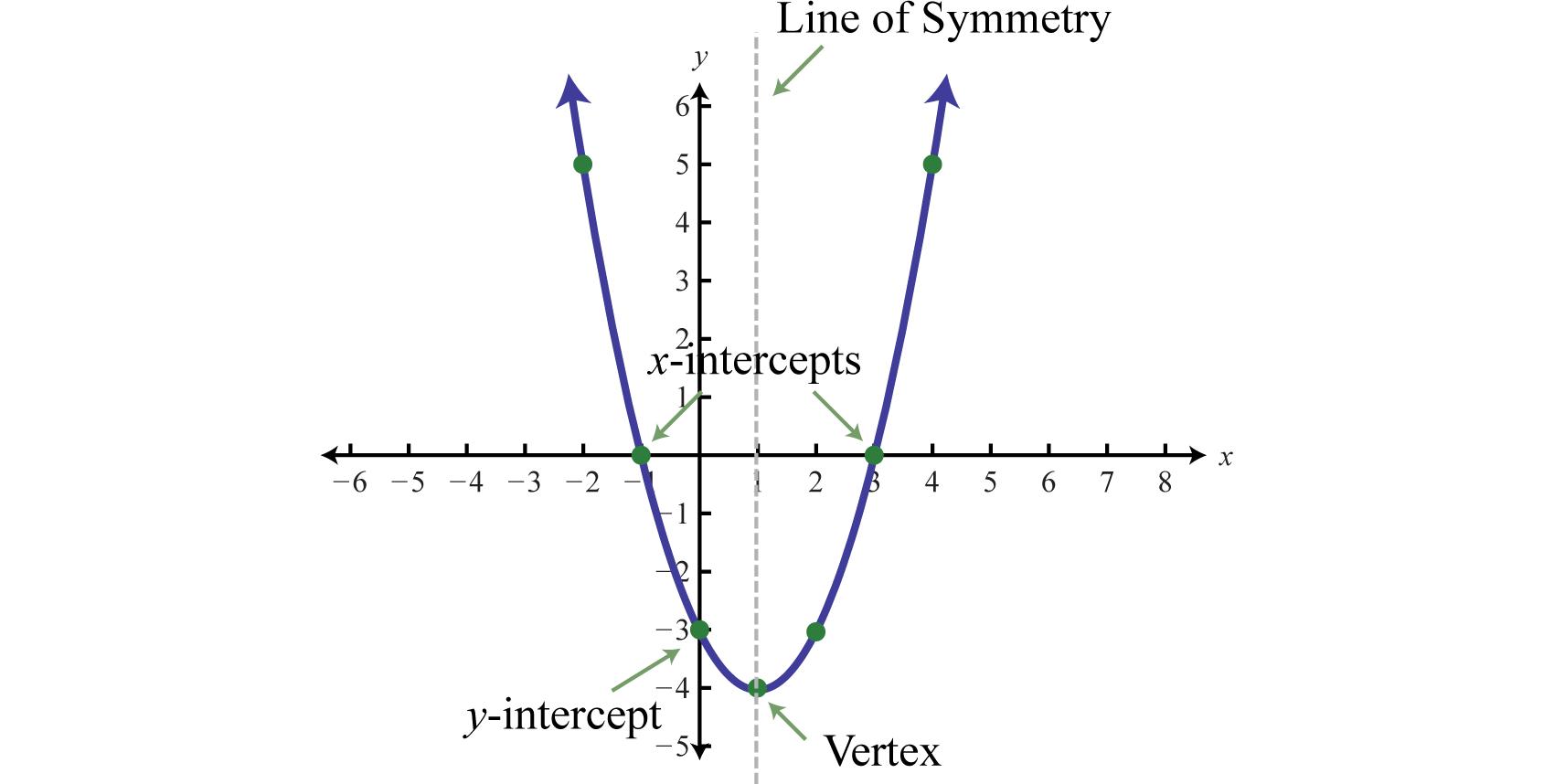
For any parabola, we will detect the vertex and y-intercept. In addition, if the x-intercepts be, and then we will desire to decide those as well. Guessing at the x-values of these special points is not practical; therefore, we will develop techniques that will facilitate finding them. Many of these techniques will be used extensively every bit we progress in our study of algebra.
Given a quadratic part , find the y-intercept past evaluating the office where In full general, , and we have
Next, recall that the ten-intercepts, if they exist, can be found by setting Doing this, we take , which has general solutions given past the quadratic formula, Therefore, the ten-intercepts take this general class:
Using the fact that a parabola is symmetric, we tin determine the vertical line of symmetry using the x-intercepts. To do this, nosotros notice the x-value midway between the x-intercepts by taking an average as follows:
Therefore, the line of symmetry is the vertical line We can use the line of symmetry to find the the vertex.
Generally three points decide a parabola. However, in this section nosotros volition find five points and then that we tin can go a better approximation of the general shape. The steps for graphing a parabola are outlined in the following example.
Example 1
Graph:
Solution:
Stride 1: Determine the y-intercept. To do this, set and find
The y-intercept is
Step 2: Determine the 10-intercepts if any. To practise this, set and solve for x.
Here where , we obtain two solutions. Hence, at that place are two ten-intercepts, and
Step 3: Determine the vertex. 1 way to do this is to kickoff use to find the x-value of the vertex then substitute this value in the office to notice the corresponding y-value. In this example, and
Substitute −1 into the original role to find the respective y-value.
The vertex is
Pace 4: Determine extra points so that we accept at to the lowest degree five points to plot. Ensure a good sampling on either side of the line of symmetry. In this instance, one other signal volition suffice. Choose and find the corresponding y-value.
Our fifth point is
Step 5: Plot the points and sketch the graph. To recap, the points that nosotros accept found are
Answer:
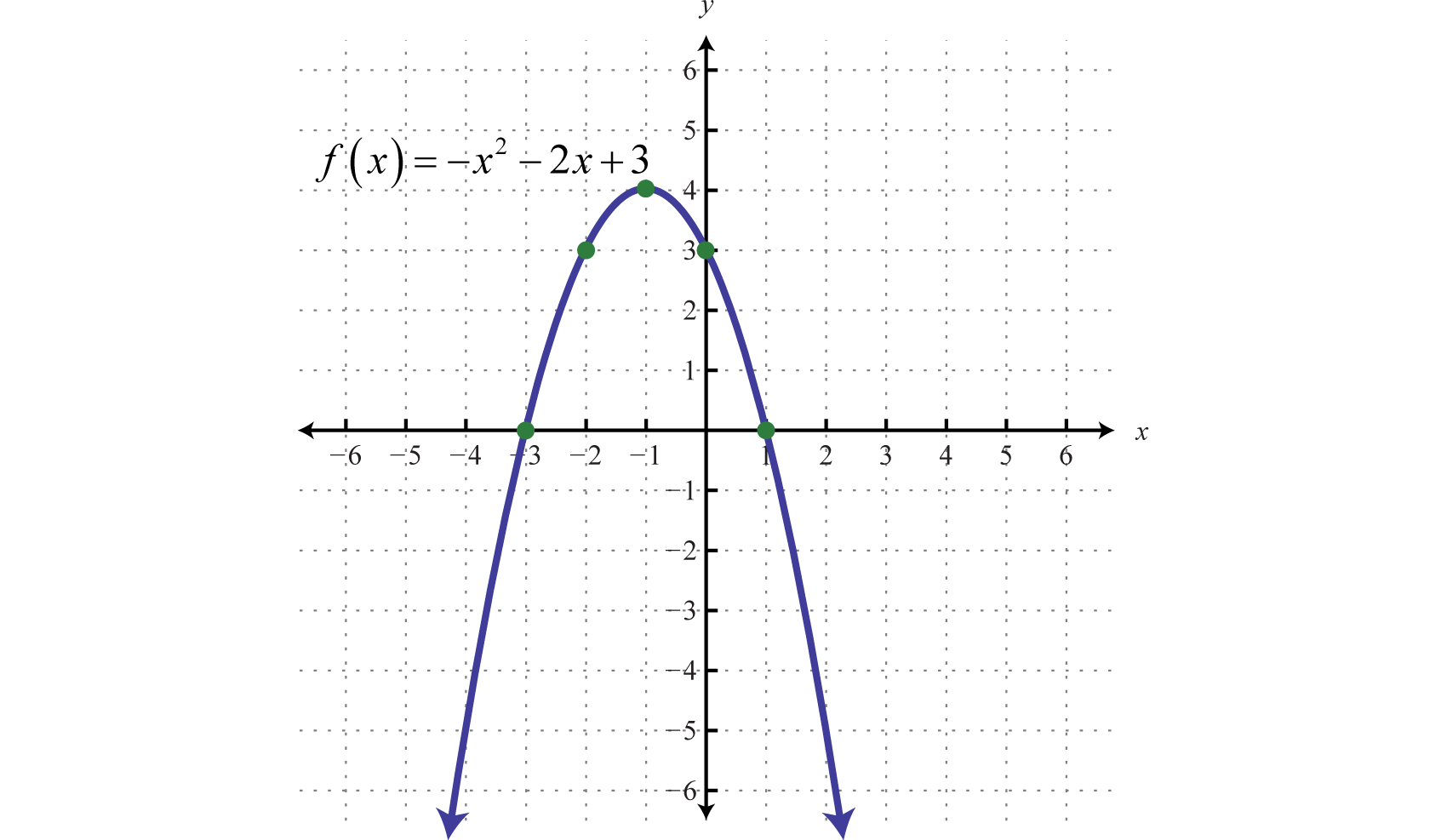
The parabola opens downward. In general, employ the leading coefficient to determine if the parabola opens upward or downward. If the leading coefficient is negative, every bit in the previous instance, and so the parabola opens down. If the leading coefficient is positive, then the parabola opens upward.

All quadratic functions of the form have parabolic graphs with y-intercept However, not all parabolas have 10-intercepts.
Example 2
Graph:
Solution:
Because the leading coefficient 2 is positive, nosotros note that the parabola opens upwardly. Here c = 5 and the y-intercept is (0, five). To detect the x-intercepts, gear up
In this case, a = two, b = 4, and c = v. Use the discriminant to determine the number and blazon of solutions.
Since the discriminant is negative, we conclude that at that place are no real solutions. Because there are no real solutions, there are no x-intercepts. Next, we make up one's mind the x-value of the vertex.
Given that the x-value of the vertex is −1, substitute −one into the original equation to detect the corresponding y-value.
The vertex is (−1, 3). And so far, we have only two points. To make up one's mind three more, choose some x-values on either side of the line of symmetry, x = −one. Here nosotros choose x-values −three, −2, and 1.
To summarize, nosotros have
Plot the points and sketch the graph.
Answer:
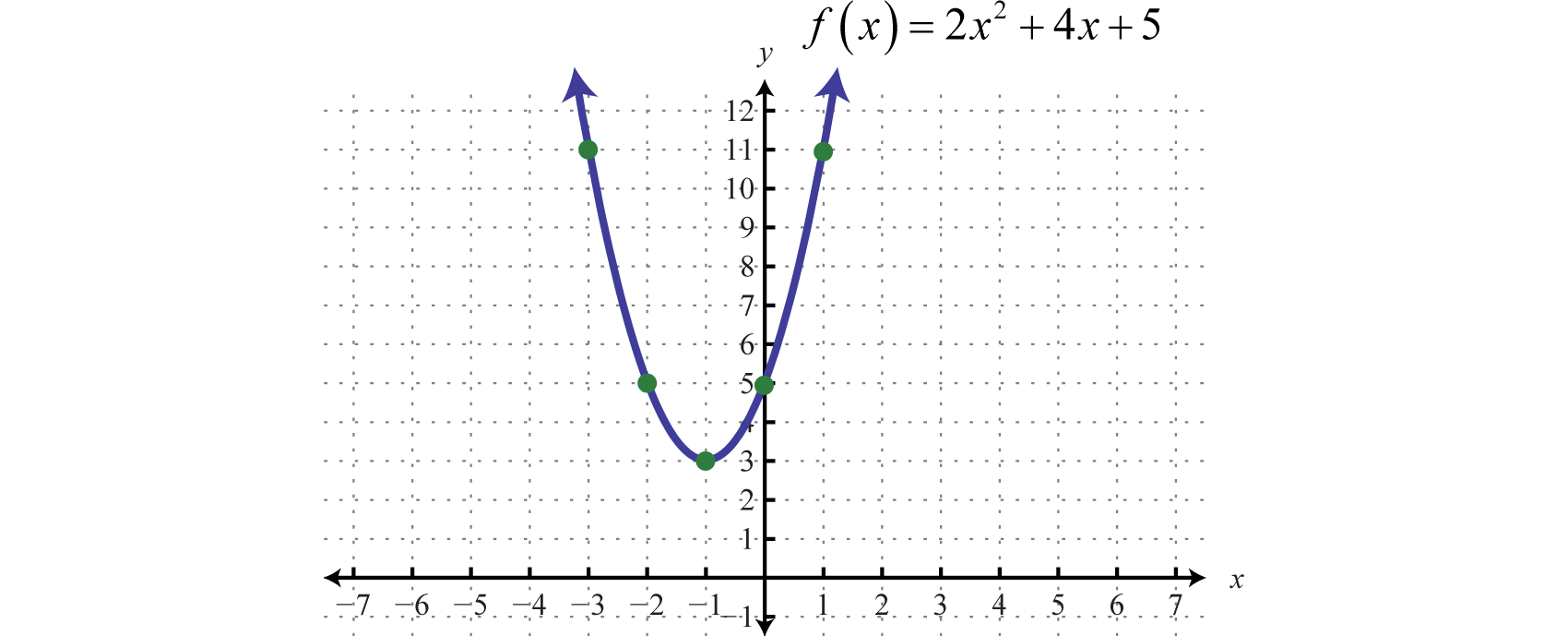
Example iii
Graph:
Solution:
Since a = 1, the parabola opens upward. Furthermore, c = −1, so the y-intercept is To discover the 10-intercepts, fix
In this instance, solve using the quadratic formula with a = i, b = −2, and c = −i.
Here we obtain two existent solutions for ten, and thus in that location are two x-intercepts:
Approximating the x-intercepts using a calculator will help us plot the points. Nonetheless, we volition present the exact x-intercepts on the graph. Adjacent, discover the vertex.
Given that the x-value of the vertex is i, substitute into the original equation to find the corresponding y-value.
The vertex is (1, −2). Nosotros demand one more than indicate.
To summarize, nosotros have
Plot the points and sketch the graph.
Reply:
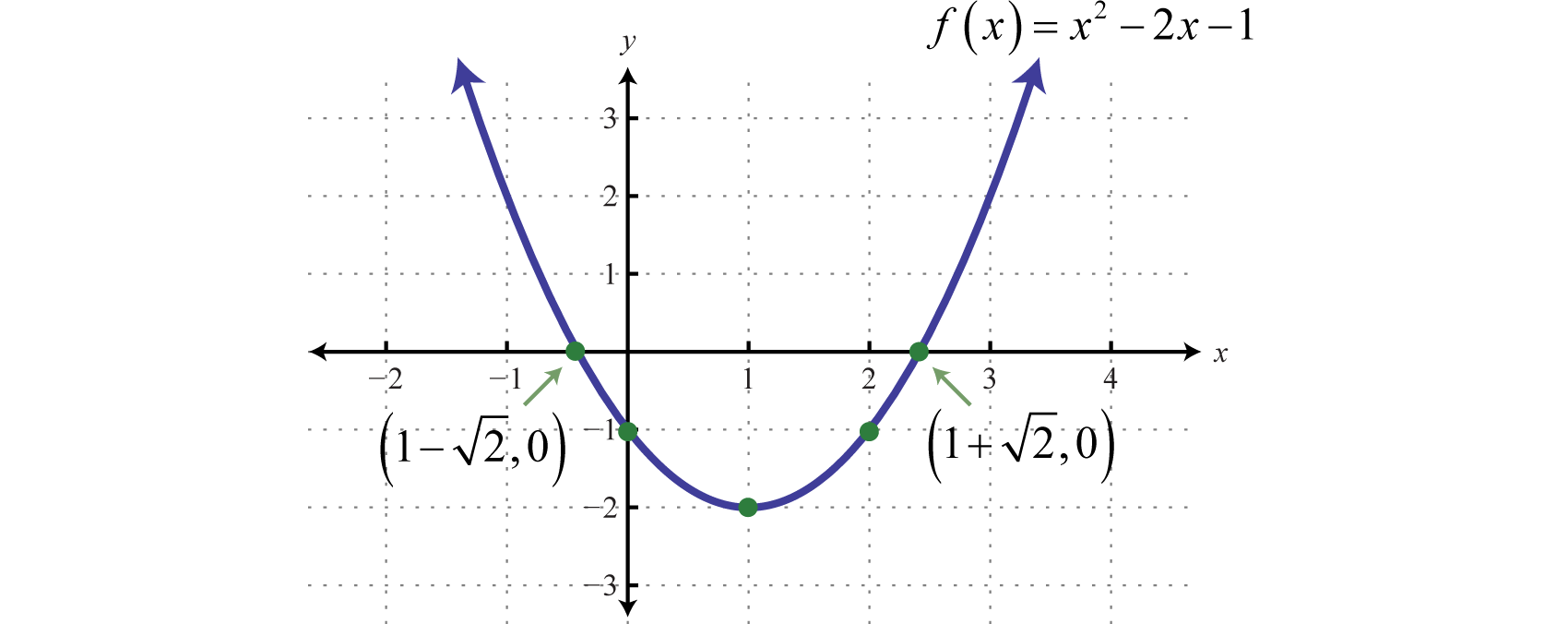
Attempt this! Graph:
Answer:
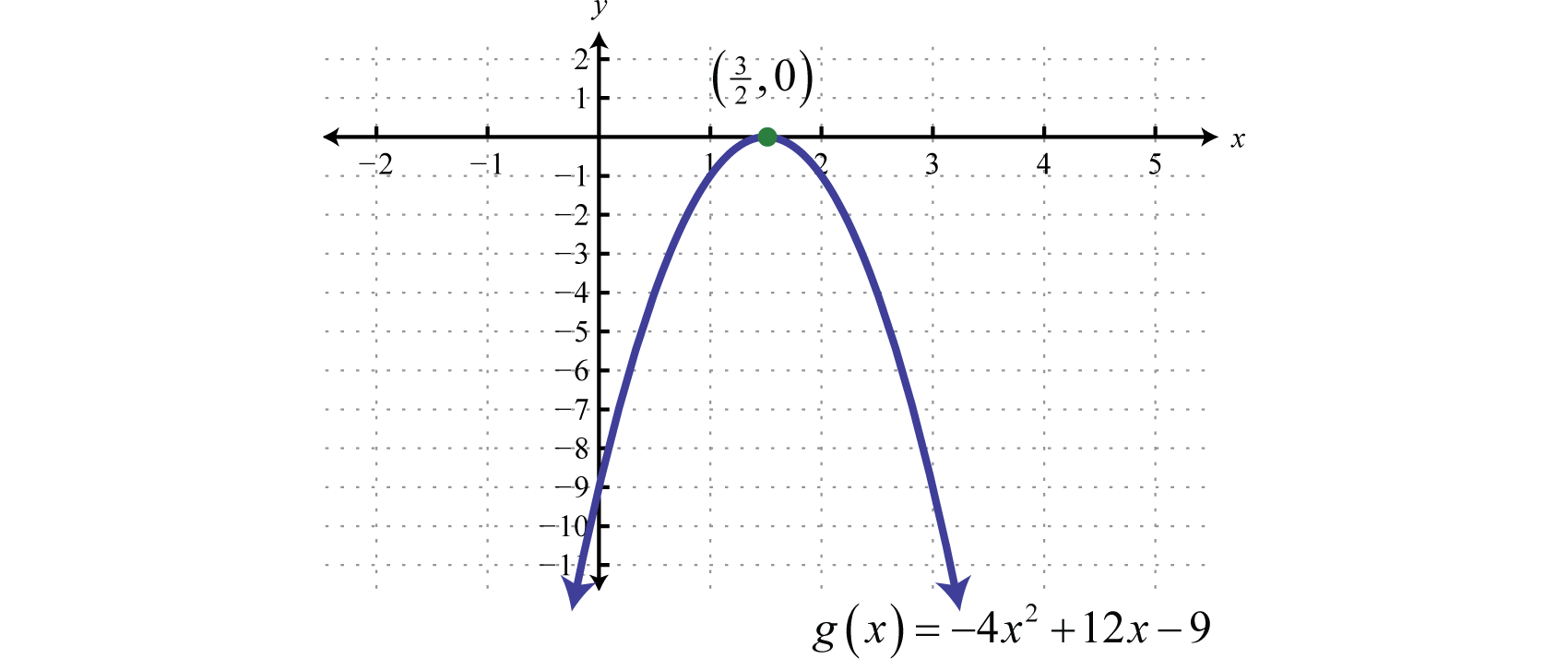
Finding the Maximum or Minimum
Information technology is often useful to find the maximum and/or minimum values of functions that model real-life applications. To observe these important values given a quadratic function, nosotros use the vertex. If the leading coefficient a is positive, and so the parabola opens upward and there will exist a minimum y-value. If the leading coefficient a is negative, and so the parabola opens downward and there will exist a maximum y-value.
Instance 4
Make up one's mind the maximum or minimum:
Solution:
Since a = −iv, we know that the parabola opens downward and in that location volition be a maximum y-value. To observe it, first find the x-value of the vertex.
The x-value of the vertex is 3. Substitute this value into the original equation to find the corresponding y-value.
The vertex is (3, i). Therefore, the maximum y-value is 1, which occurs where x = 3, as illustrated below:
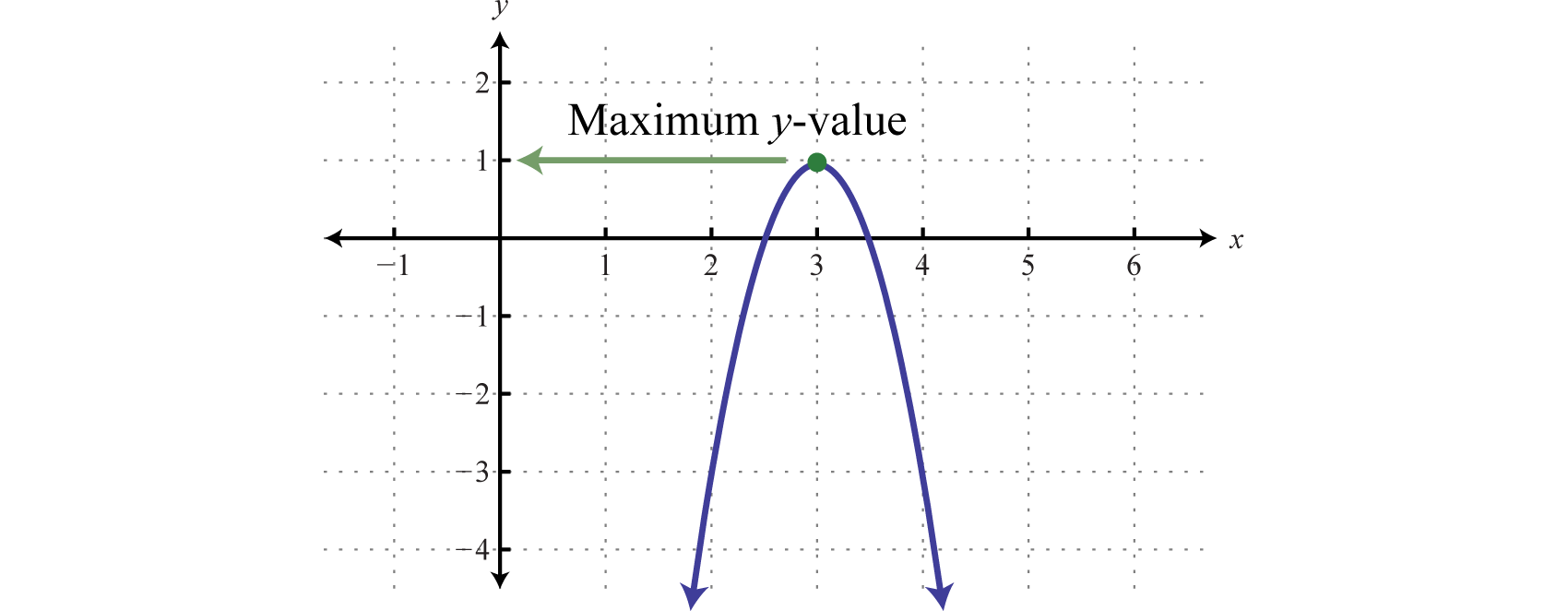
Annotation: The graph is not required to respond this question.
Answer: The maximum is 1.
Case 5
Determine the maximum or minimum:
Solution:
Since a = 4, the parabola opens upward and there is a minimum y-value. Begin by finding the x-value of the vertex.
Substitute x = iv into the original equation to find the corresponding y-value.
The vertex is (4, −2). Therefore, the minimum y-value of −ii occurs where x = four, as illustrated below:
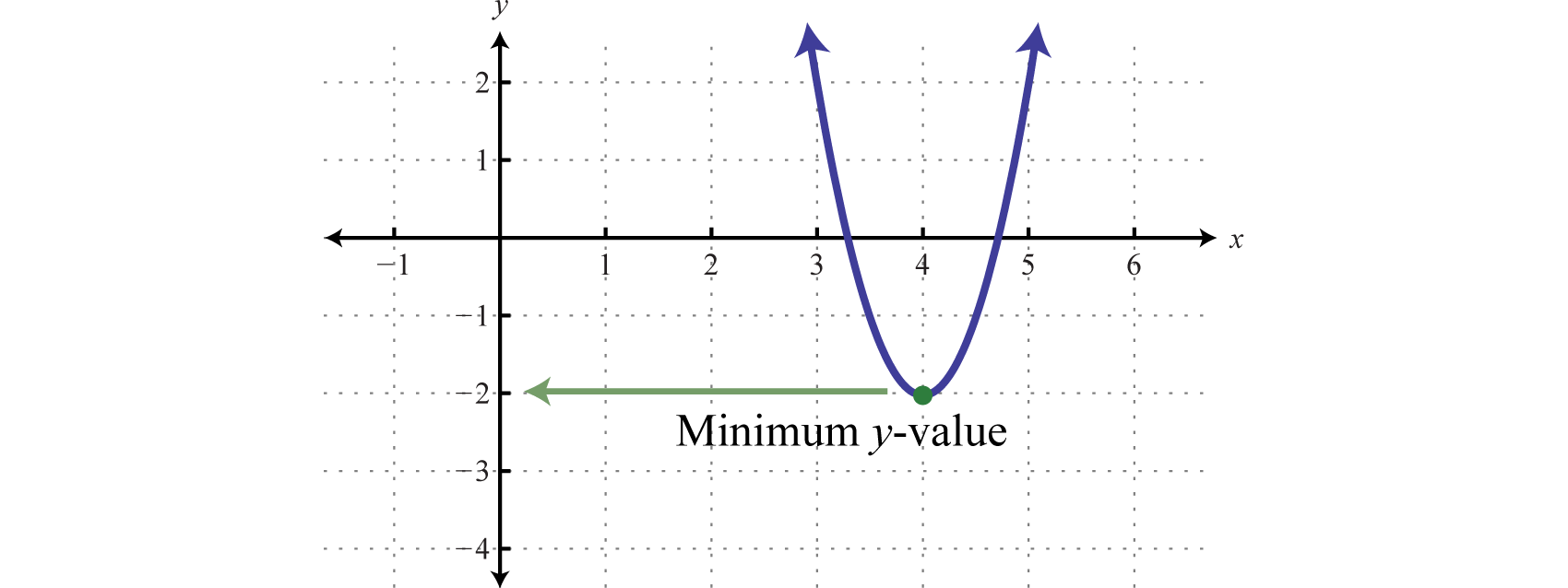
Answer: The minimum is −2.
Example half-dozen
The height in feet of a projectile is given past the part , where t represents the fourth dimension in seconds after launch. What is the maximum height reached by the projectile?
Solution:
Here , and the parabola opens downward. Therefore, the y-value of the vertex determines the maximum peak. Begin by finding the time at which the vertex occurs.
The maximum summit volition occur in seconds (or seconds). Substitute this fourth dimension into the function to determine the maximum height attained.
Respond: The maximum peak of the projectile is 81 feet.
Finding the Vertex by Completing the Foursquare
In this section, we demonstrate an alternating approach for finding the vertex. Any quadratic role can be rewritten in vertex classA quadratic function written in the form ,
In this form, the vertex is To encounter that this is the case, consider graphing using the transformations.
Utilise these translations to sketch the graph,
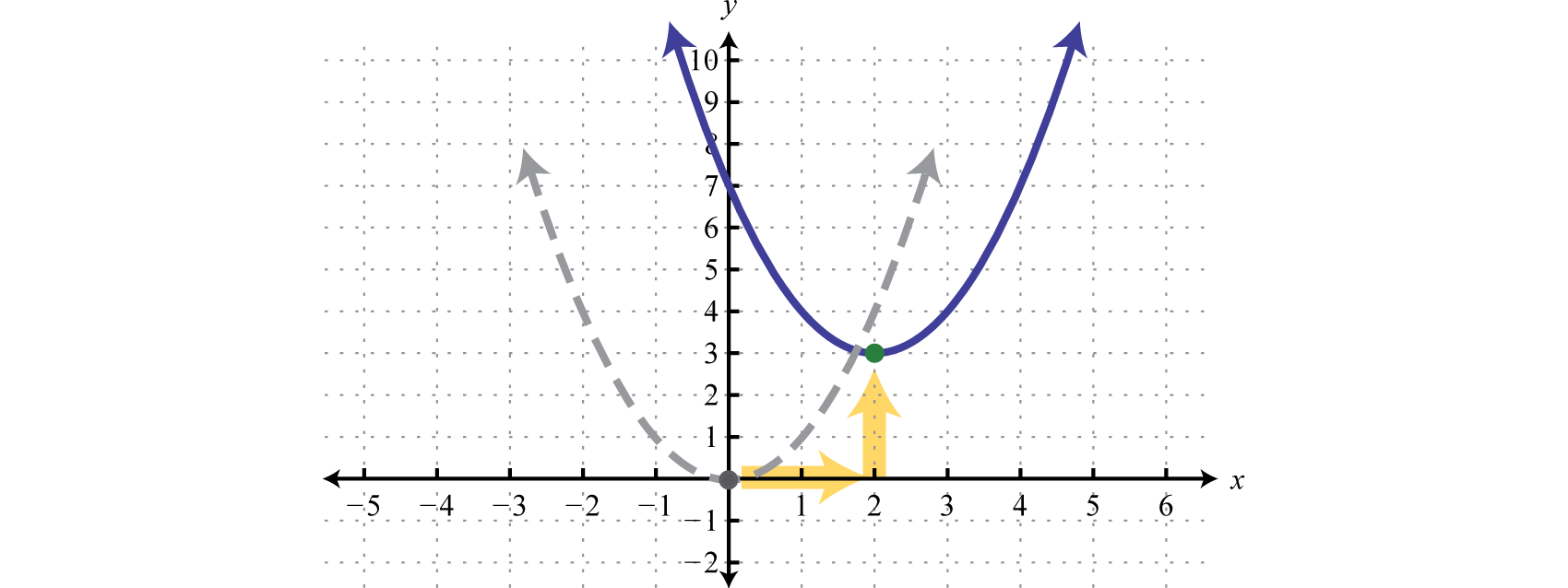
Here we can see that the vertex is (2, 3).
When the equation is in this grade, we tin read the vertex directly from information technology.
Example vii
Determine the vertex:
Solution:
Rewrite the equation every bit follows before determining h and k.
Here h = −3 and k = −2.
Answer: The vertex is (−three, −2).
Often the equation is non given in vertex class. To obtain this form, complete the square.
Example 8
Rewrite in vertex class and decide the vertex:
Solution:
Begin by making room for the abiding term that completes the square.
The idea is to add together and subtract the value that completes the square, , and then factor. In this example, add and subtract
Adding and subtracting the same value within an expression does not change information technology. Doing so is equivalent to adding 0. In one case the equation is in this form, nosotros can easily determine the vertex.
Here h = −2 and chiliad = five.
Answer: The vertex is (−two, 5).
If there is a leading coefficient other than ane, and so nosotros must beginning factor out the leading coefficient from the first 2 terms of the trinomial.
Example 9
Rewrite in vertex form and make up one's mind the vertex:
Solution:
Since a = 2, cistron this out of the offset two terms in order to complete the square. Exit room inside the parentheses to add and subtract the value that completes the square.
Now use −2 to make up one's mind the value that completes the square. In this example, Add and subtract 1 and gene as follows:
In this form, we can easily determine the vertex.
Here h = ane and 1000 = 6.
Answer: The vertex is (i, half dozen).
Attempt this! Rewrite in vertex form and determine the vertex:
Reply: ; vertex:
Key Takeaways
- The graph of any quadratic function , where a, b, and c are existent numbers and , is chosen a parabola.
- When graphing a parabola always find the vertex and the y-intercept. If the ten-intercepts be, discover those every bit well. Likewise, exist sure to find ordered pair solutions on either side of the line of symmetry,
- Utilize the leading coefficient, a, to determine if a parabola opens upwards or downwardly. If a is positive, and so information technology opens upward. If a is negative, then it opens downward.
- The vertex of whatever parabola has an 10-value equal to Afterward finding the x-value of the vertex, substitute it into the original equation to find the corresponding y-value. This y-value is a maximum if the parabola opens downwardly, and information technology is a minimum if the parabola opens upwards.
- The domain of a parabola opening up or downward consists of all existent numbers. The range is bounded by the y-value of the vertex.
- An alternate arroyo to finding the vertex is to rewrite the quadratic office in the class When in this class, the vertex is and tin exist read directly from the equation. To obtain this form, accept and complete the square.
Topic Exercises
Part A: The Graph of Quadratic Functions
Does the parabola open upward or down? Explain.
Determine the ten- and y-intercepts.
Find the vertex and the line of symmetry.
Graph. Notice the vertex and the y-intercept. In addition, find the ten-intercepts if they exist.
-
-
-
-
-
-
-
-
-
-
-
-
-
-
-
-
-
-
-
The height in feet reached by a baseball tossed upward at a speed of 48 feet per second from the ground is given past the office , where t represents the time in seconds afterward the ball is thrown. What is the baseball's maximum height and how long does information technology take to attain that height?
-
The height in feet of a projectile launched straight up from a mound is given past the role , where t represents seconds after launch. What is the maximum height?
-
The turn a profit in dollars generated past producing and selling x custom lamps is given by the role What is the maximum profit?
-
The profit in dollars generated from producing and selling a detail item is modeled by the formula , where x represents the number of units produced and sold. What number of units must exist produced and sold to maximize revenue?
-
The boilerplate number of hits to a radio station Web site is modeled by the formula , where t represents the number of hours since viii:00 a.m. At what hour of the twenty-four hour period is the number of hits to the Web site at a minimum?
-
The value in dollars of a new car is modeled past the formula , where t represents the number of years since it was purchased. Determine the minimum value of the automobile.
-
The daily production cost in dollars of a textile manufacturing company producing custom uniforms is modeled by the formula , where x represents the number of uniforms produced.
- How many uniforms should exist produced to minimize the daily product costs?
- What is the minimum daily product cost?
-
The surface area in square feet of a certain rectangular pen is given by the formula , where w represents the width in feet. Determine the width that produces the maximum surface area.
Part B: Finding the Maximum or Minimum
Determine the maximum or minimum y-value.
Given the following quadratic functions, decide the domain and range.
Part C: Finding the Vertex by Completing the Square
Determine the vertex.
Rewrite in vertex class and determine the vertex.
Graph. Notice the vertex and the y-intercept. In addition, discover the x-intercepts if they exist.
-
Write down your plan for graphing a parabola on an exam. What will you be looking for and how will y'all present your respond? Share your plan on the word board.
-
Why is any parabola that opens upward or downward a function? Explain to a classmate how to determine the domain and range.
-
Research and discuss means of finding a quadratic function that has a graph passing through any iii given points. Share a list of steps as well equally an example of how to practise this.
Part D: Discussion Lath
Answers
-
Upward
-
Downward
-
Downward
-
x-intercepts: (−6, 0), (2, 0);y-intercept: (0, −12)
-
x-intercepts: (−3, 0), ; y-intercept: (0, −three)
-
x-intercepts: (−1, 0), ; y-intercept: (0, 2)
-
x-intercepts: , ; y-intercept: (0, −27)
-
x-intercepts: none; y-intercept: (0, 1)
-
Vertex: (five, −ix); line of symmetry:
-
Vertex: ; line of symmetry:
-
Vertex: (0, −1); line of symmetry:
-
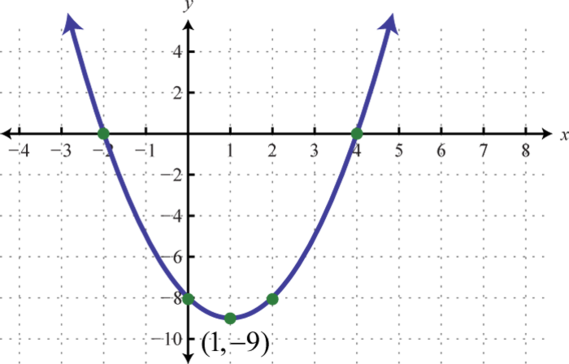
-
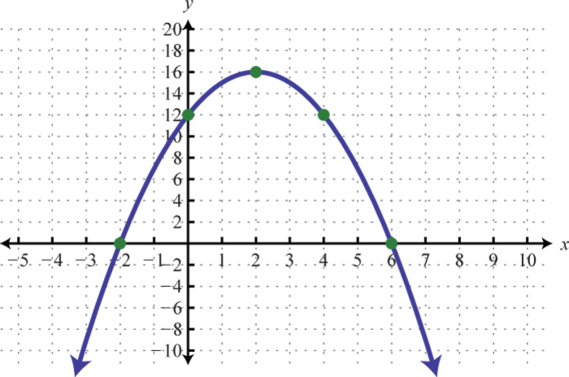
-
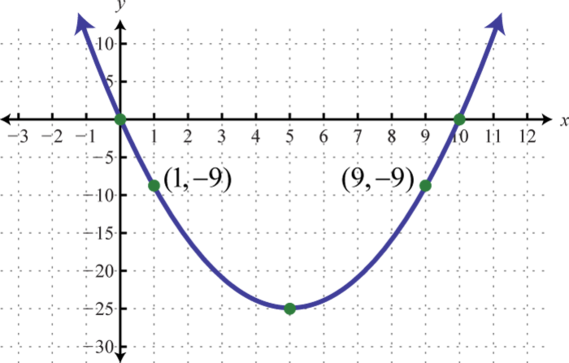
-
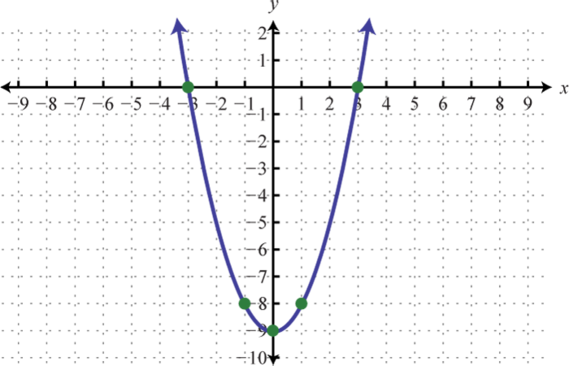
-
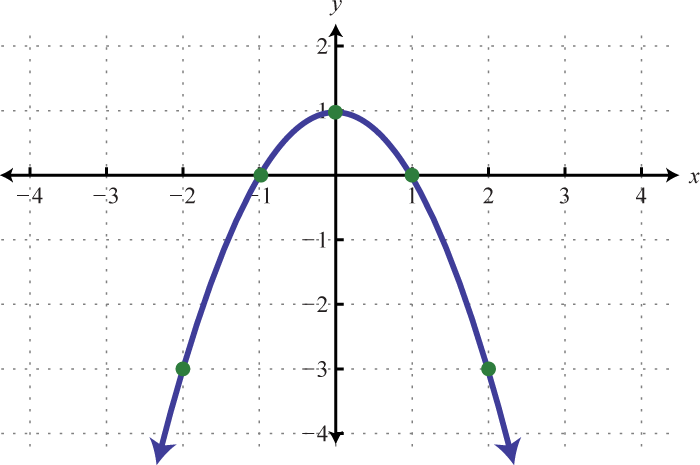
-
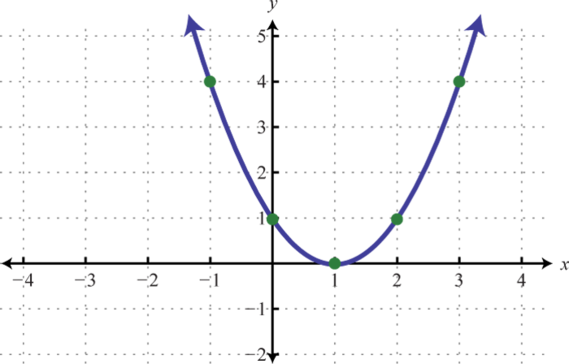
-
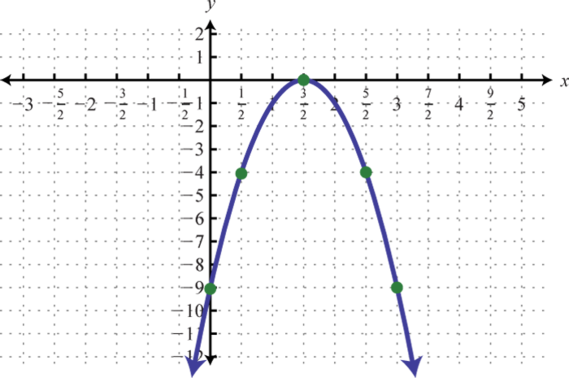
-
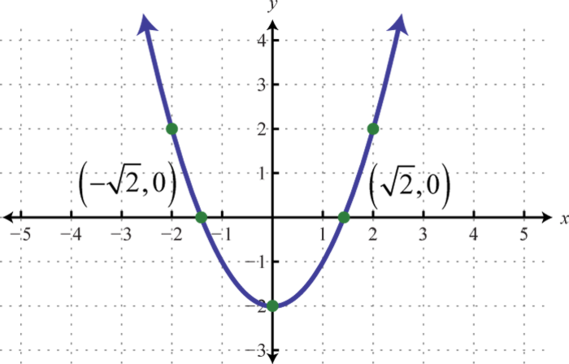
-
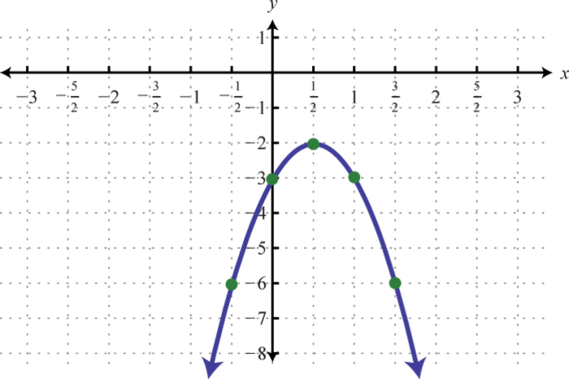
-
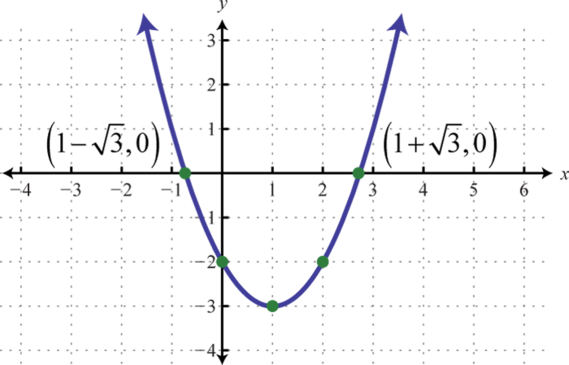
-
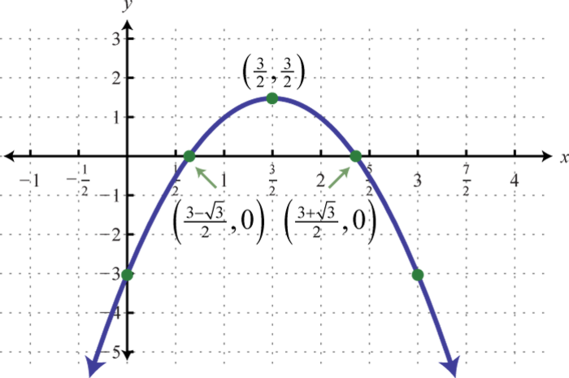
-
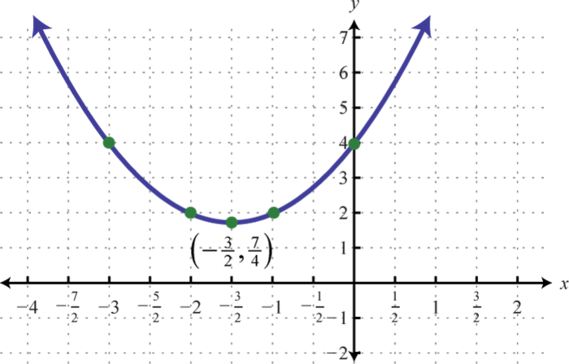
-
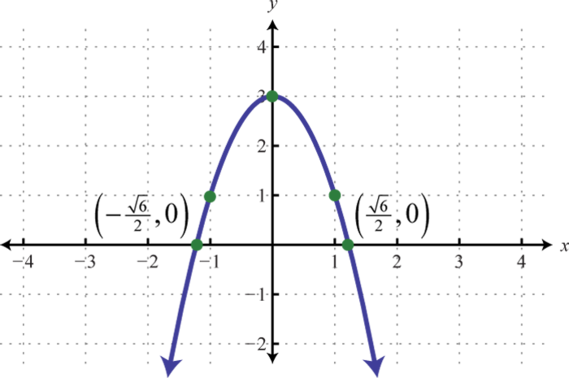
-
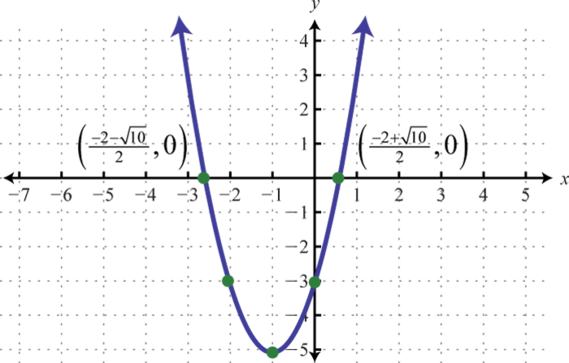
-
Maximum: y = 10
-
Minimum: y = four
-
Maximum: y = 0
-
Maximum: y = 10
-
Minimum:
-
Minimum:
-
Domain: ; range:
-
Domain: ; range:
-
Domain: ; range:
-
The maximum summit of 36 anxiety occurs after 1.5 seconds.
-
$four,000
-
12:00 p.m.
-
- 500 uniforms
- $5,000
-
(5, 3)
-
(−one, half-dozen)
-
(−viii, −1)
-
; vertex: (7, −25)
-
; vertex: (−two, −16)
-
; vertex: (3, −21)
-
; vertex: (eight, 81)
-
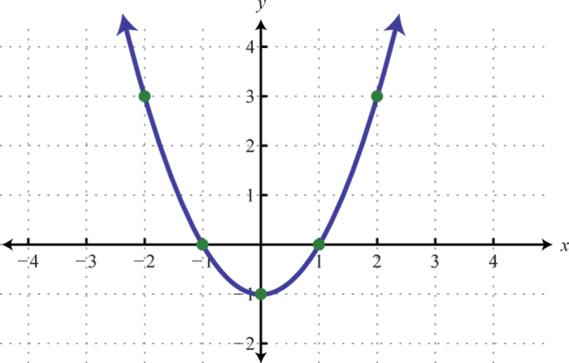
-
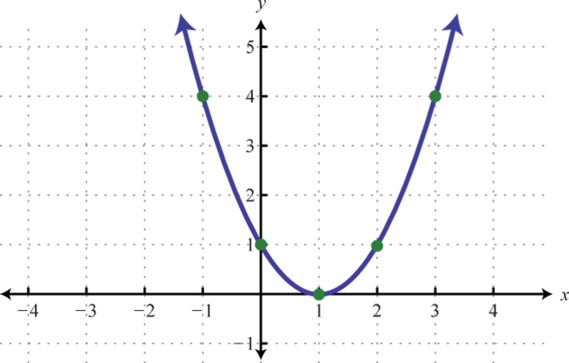
-
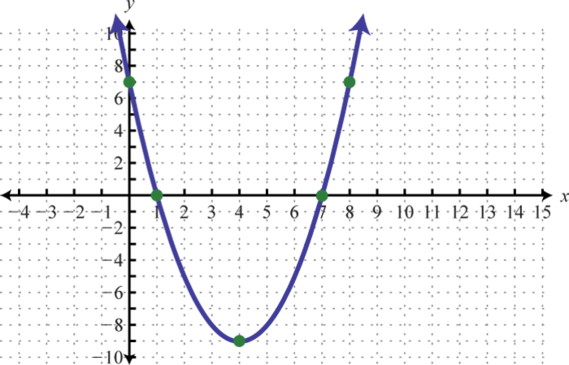
-
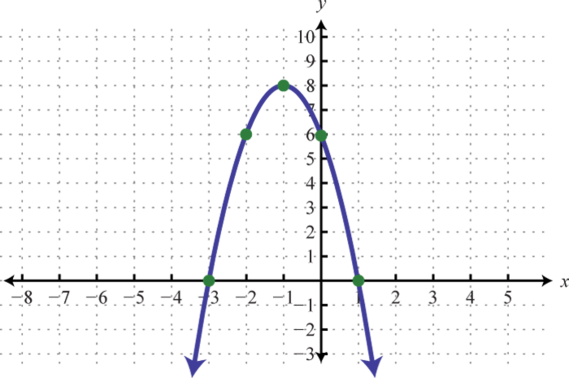
-
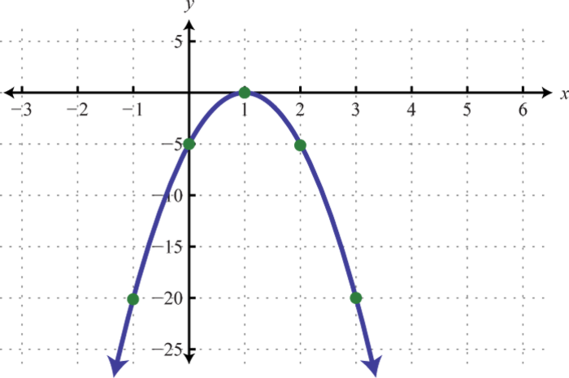
-
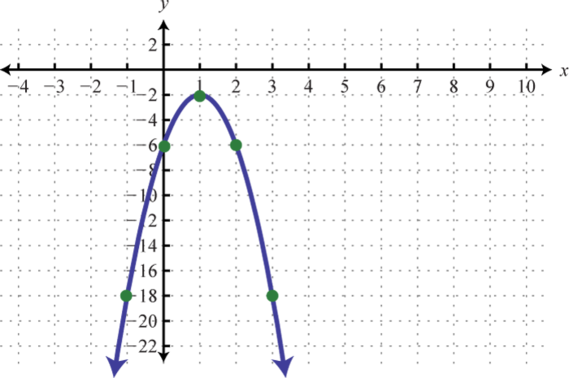
-
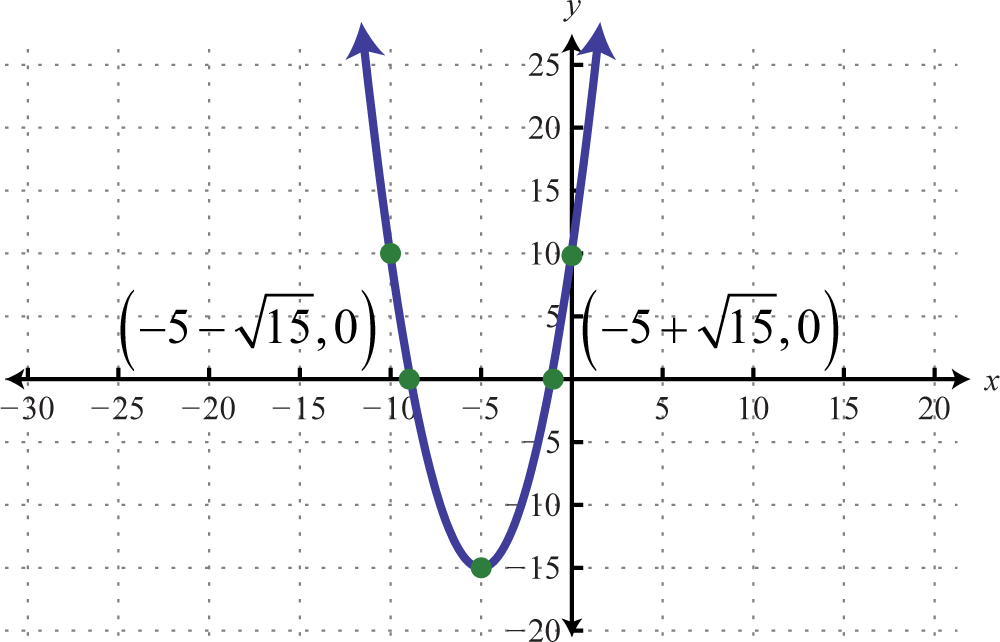
-
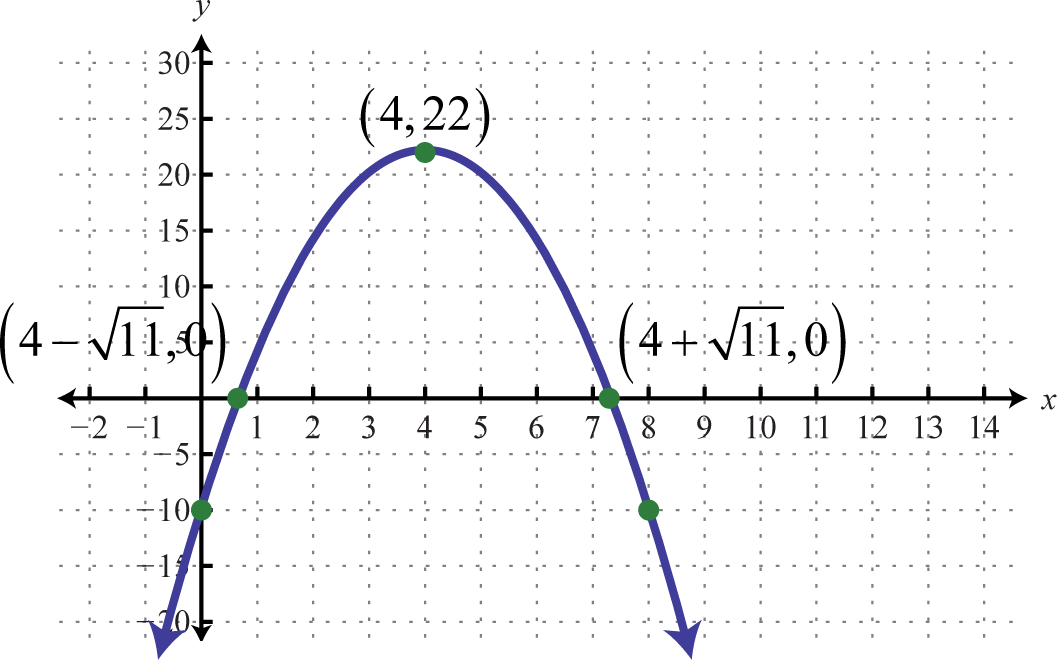
-
Answer may vary
-
Answer may vary
macdonaldpown1998.blogspot.com
Source: https://saylordotorg.github.io/text_intermediate-algebra/s09-04-quadratic-functions-and-their-.html
0 Response to "8-64. WHAT DO YOU NEED TO SKETCH A PARABOLA?"
إرسال تعليق